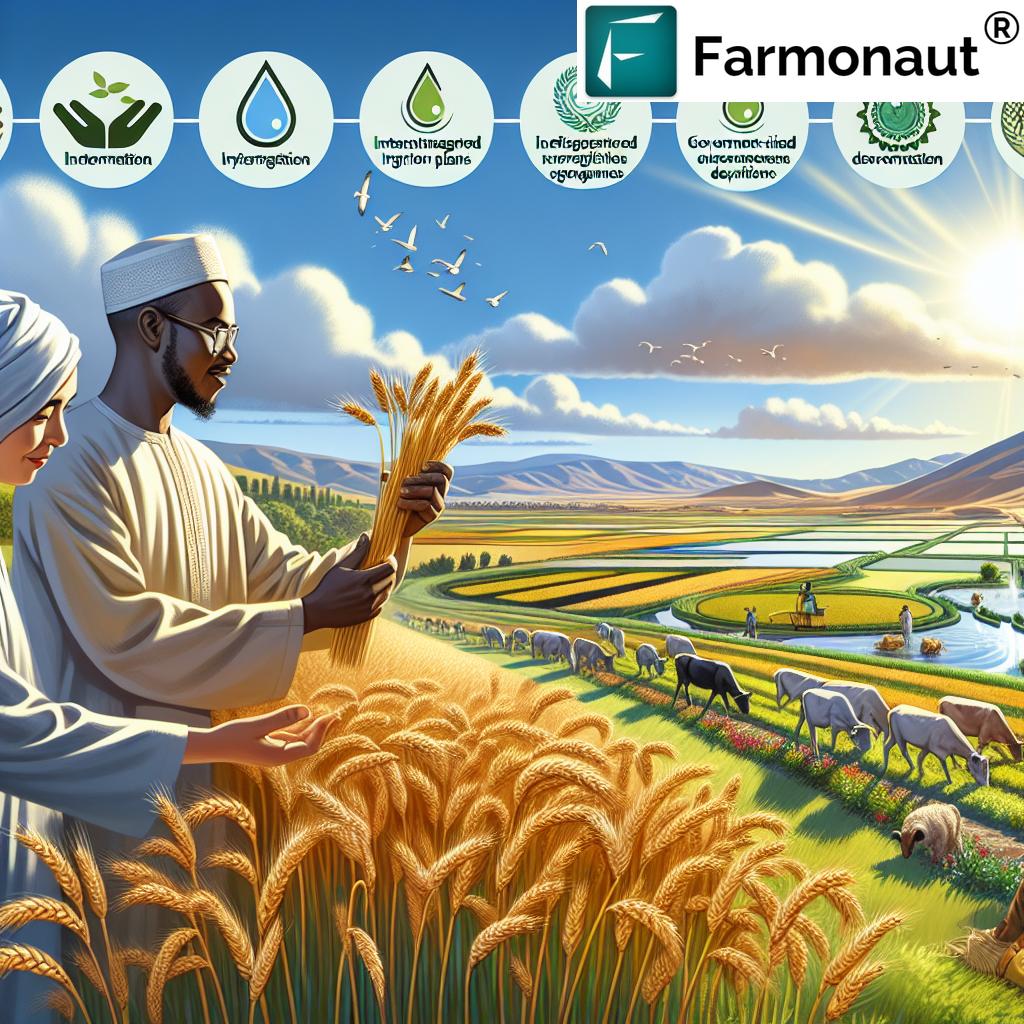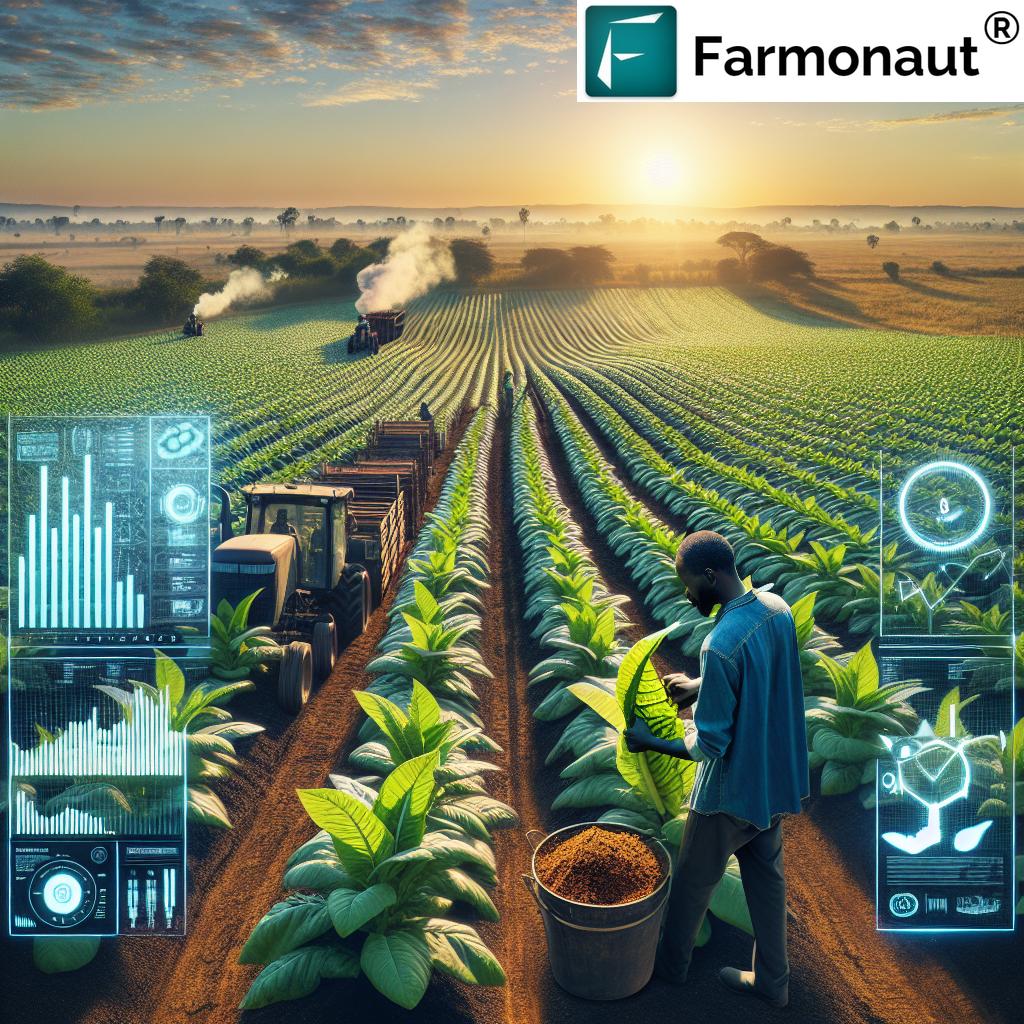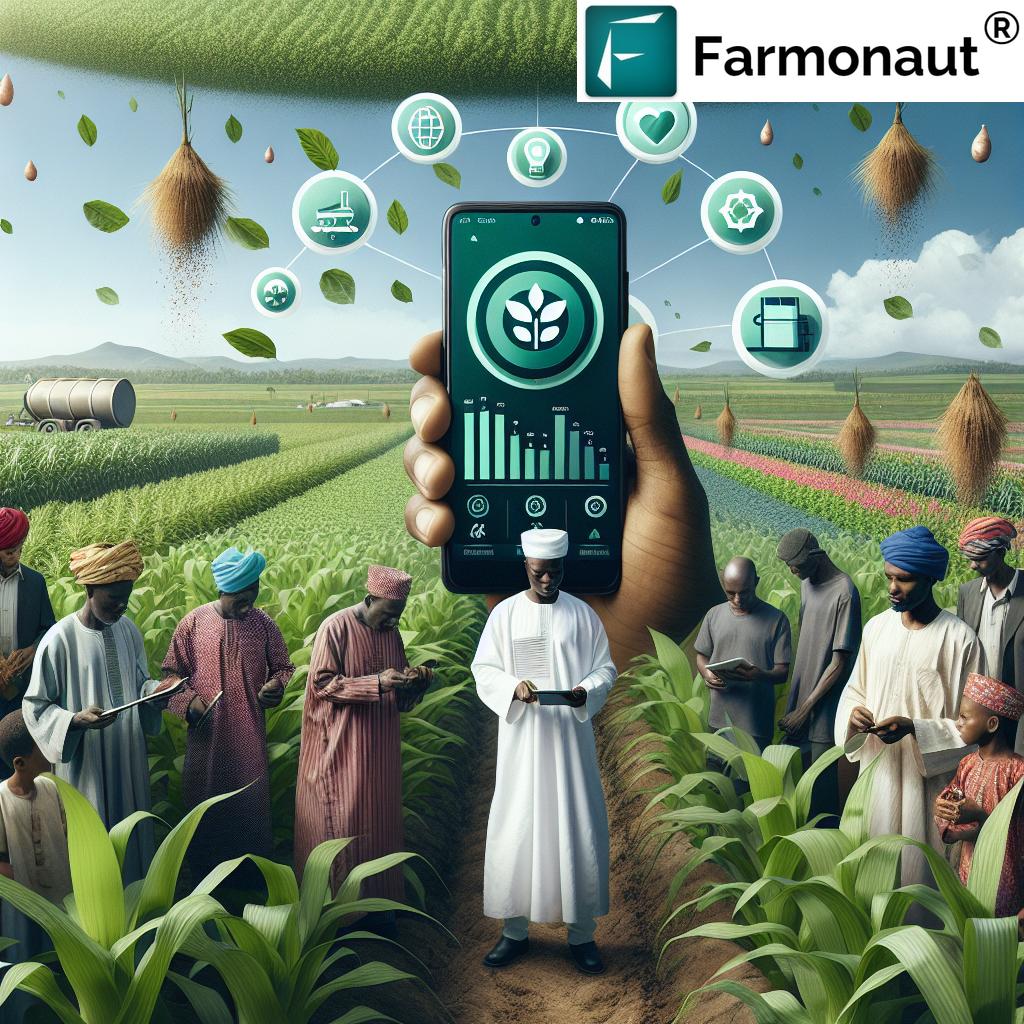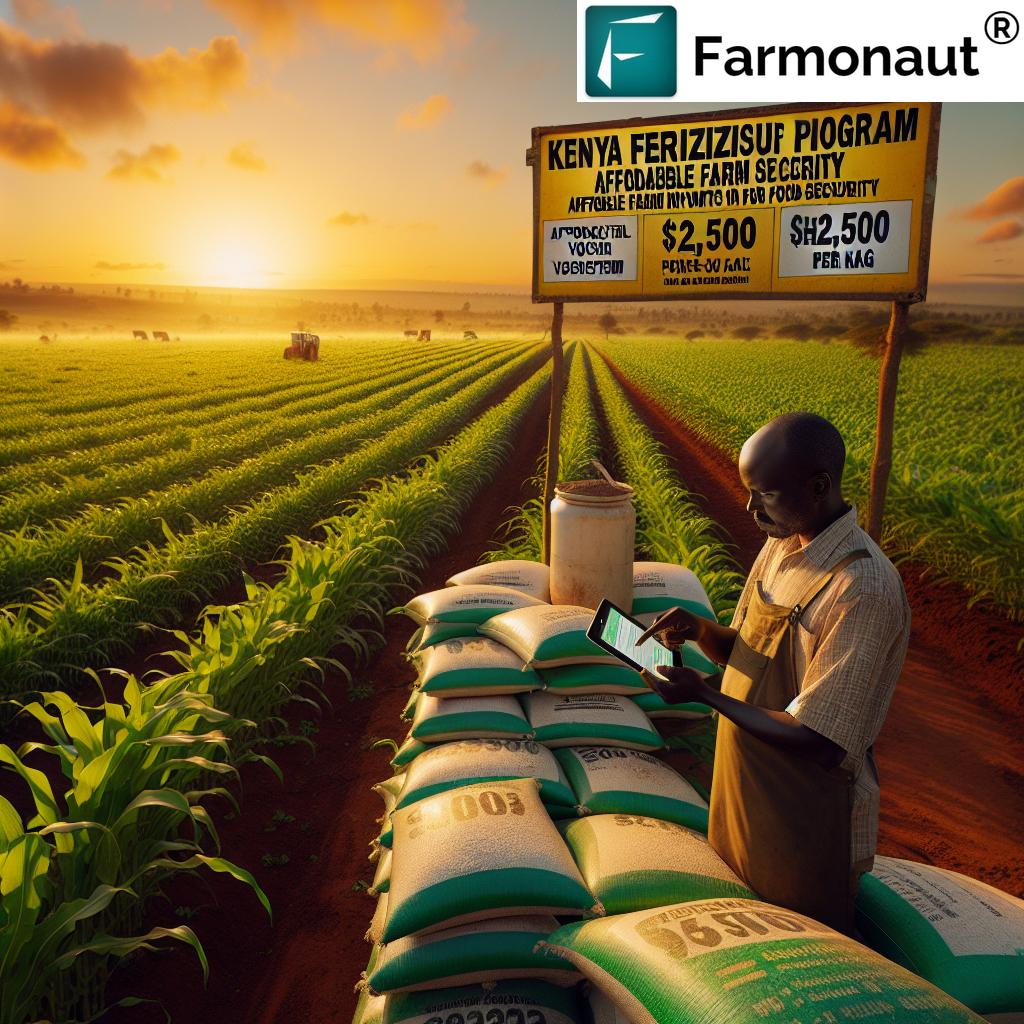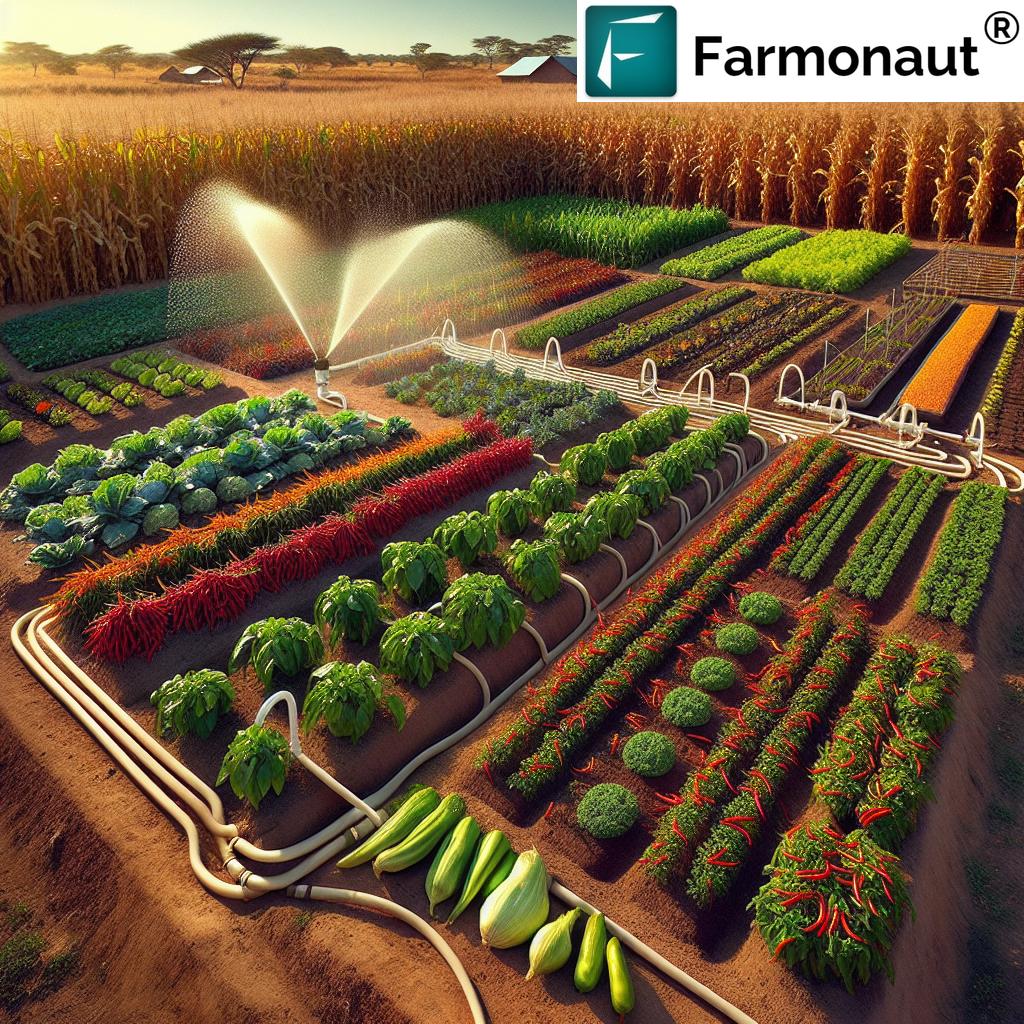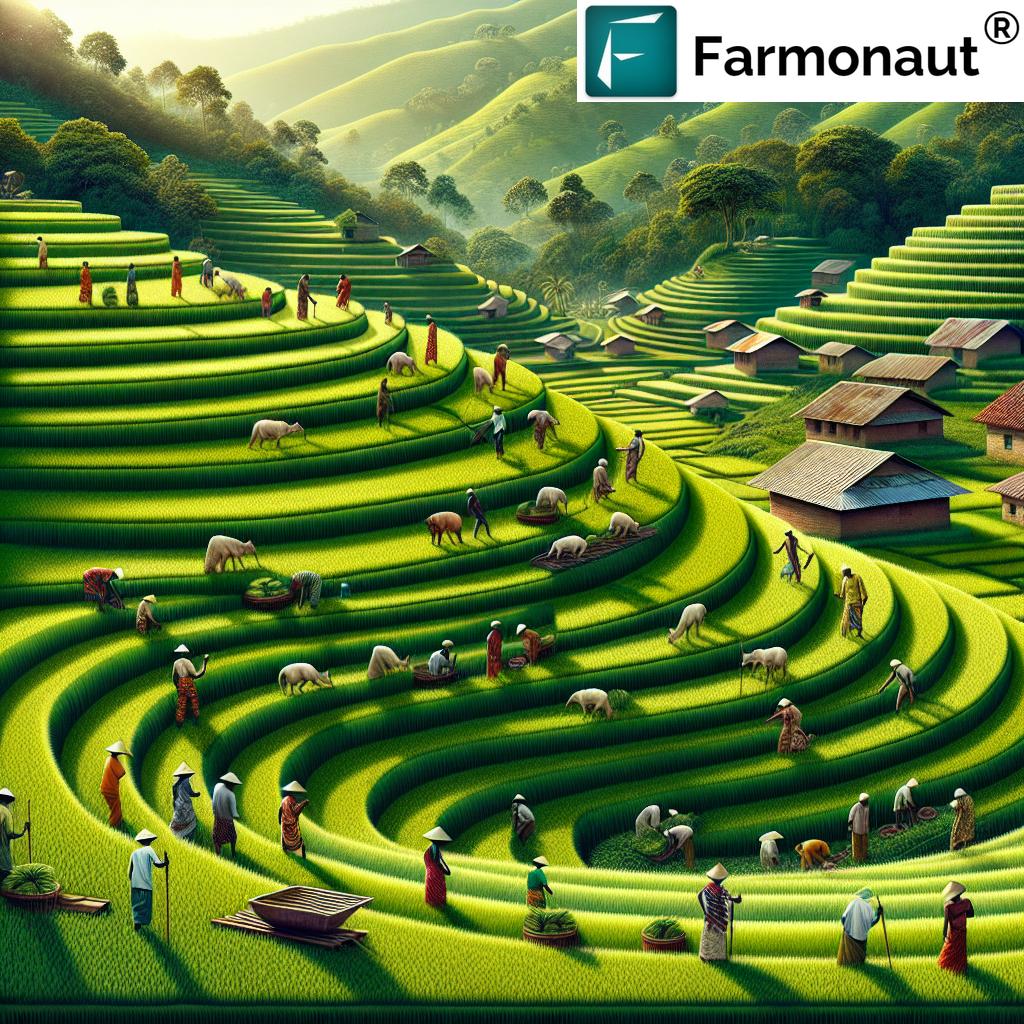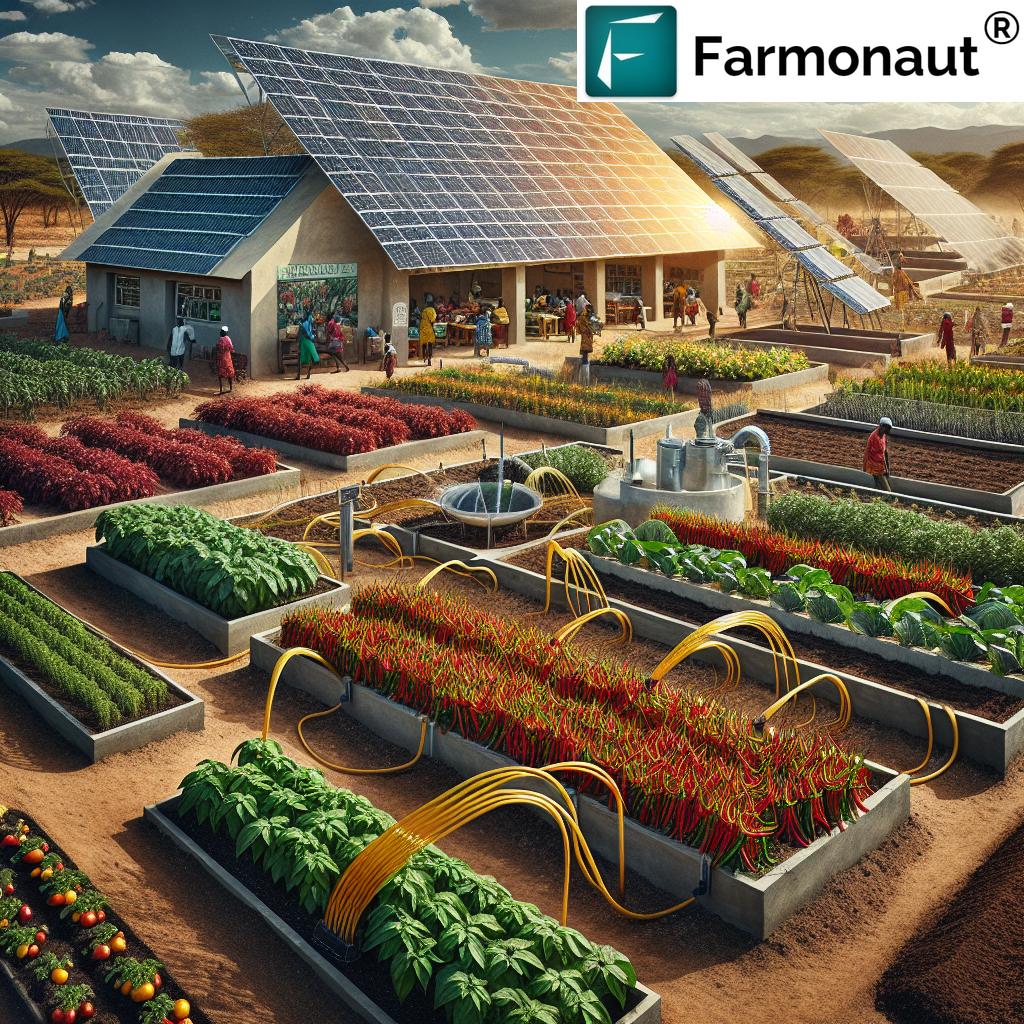Table of Contents
- Introduction: Morocco’s Agricultural Resurgence
- Trivia: 2024 Morocco Grain Harvest
- Rainfall Impact on Farming in Morocco
- 41% Grain Harvest Surge in 2024: What It Means
- Sustainable Water Management in Agriculture
- Building Resilience: Drought Recovery in Moroccan Agriculture
- Green Generation Strategy & Irrigation Plan in Morocco
- Technology for Sustainable Farming: Farmonaut Solutions
- Year-on-Year Grain Harvest & Rainfall Comparison Table
- Trivia: Rainfall Supports Morocco’s Sustainable Agriculture
- Farmonaut Digital Tools: Precision, Traceability & Sustainability
- Food Security in Morocco: Present & Future
- FAQ: Morocco Agriculture & Farmonaut
- Conclusion: Harnessing Rainfall into Sustainable Progress
Morocco Rainfall Boosts Agriculture: 41% Grain Harvest Surge in 2024
Focus Keywords: Morocco agricultural season, rainfall impact on farming, grain harvest Morocco, irrigation plan Morocco, sustainable farming practices, food security in Morocco
The 2024 Morocco agricultural season marks a pivotal moment for our country’s farming sector. With improved rainfall after years of drought, Morocco has witnessed a remarkable 41% surge in grain harvest, expected to reach 44 million quintals. This achievement reflects successful rainfall impact on farming and highlights robust water management in agriculture, comprehensive irrigation plans, and bold moves toward sustainable, resilient agriculture.
At the heart of these advances are Morocco’s farmers—supported by innovative government initiatives, strategic use of digital technology, and a national commitment to food security and sustainability. In this blog, we will explore how a promising rainy season, groundbreaking irrigation plans, resilient farming strategies, and advanced tools such as those offered by Farmonaut converge to sculpt Morocco’s agricultural renaissance.
“Morocco’s 2024 grain harvest surged by 41% due to improved rainfall, strengthening national food security.”
Rainfall Impact on Farming: The Turnaround for Morocco’s Agricultural Sector
Our nation experienced critical rainfall during March and early April 2024, marking a sharp departure from previous dry seasons. These “blessed rains” had a strong, visible effect on farming throughout multiple regions of the Kingdom. The vegetative cover of autumn cereals notably improved, while grasslands began to recover—a major boon for Morocco’s livestock and herders.
How Rainfall Revived Autumn Cereals and Crops
Improved rainfall enhanced the growth of autumn cereals like wheat, barley, and triticale. The improved rains helped seeds germinate, boosted vegetative development, and filled grain heads with nutrients. This progress was particularly evident in the more suitable agricultural areas around Meknes, Souss-Massa, Safi, and the Oriental region.
- Increased soil moisture: Fields rapidly recovered, eliminating large-scale crop failures.
- Grass regrowth: Pastures were revitalized, supporting efforts to rebuild herd sizes and livestock numbers.
- Support for herd reproduction: Ministers encouraged delays in Eid ritual slaughter to allow livestock to recover and reproduce, aiming to return national herds to pre-2020 levels.
Wider Impact: Land, Livestock, and Rural Sectors
- Land Recovery: Moisture deficits were alleviated, signaling hope for rural economies highly dependent on rain-fed agriculture.
- Livestock Recovery: As grass regrew, it became easier to raise herds and improve livestock productivity, benefiting both breeders and herders.
- Vegetative Cover and Productivity: Broadened and denser vegetative cover improves crop yields and adds organic matter back into soils.
This improvement marks the close of a distressing seven-year drought period marked by rainfall deficits that harmed the agricultural sector, farm incomes, and rural development. By 2024, the national focus was unveiling effective drought recovery agriculture measures—like the launch of integrated programs supporting breeders and a strategic government roll-out of new irrigation plans.
41% Grain Harvest Surge in 2024: What It Means for Morocco
Morocco’s grain harvest has rebounded in spectacular fashion, jumping from previous lows—and it directly shows the powerful rainfall impact on farming. The Ministry of Agriculture expects grain harvests to reach 44 million quintals (4.4 million tonnes), up 41% year-on-year.
- Grain harvest recovery demonstrates the close link between rainfall, crop health, and food security.
- This jump was declared “promising by all standards” at the Meknes International Agricultural Fair (SIAM).
- The harvest surge contributes to national food reserves, price stability, and strong rural economies.
According to Minister Ahmed El Bouari:
“The vegetative cover of autumn cereals has greatly improved, especially in the best-suited areas… The rain has helped grass grow back and supported efforts to allow our national herds to reproduce.”
How Grain Surges Affect the Economy and Food Security
- Reduces import dependency: A better grain harvest means reduced need for international grain purchases.
- Bolsters the national food reserve: Higher grain yield gears Morocco toward food security.
- Stabilizes rural markets: Prosperous farming seasons strengthen local economies, especially in areas like Meknes and central plains.
Sustainable Water Management in Agriculture: Strategies for the Future
The rainfall improvements have had a positive impact on national water reserves and irrigation plans. This season’s rains will allow the government to roll out a new, robust irrigation plan Morocco—a vital factor in adapting to future droughts and supporting the Green Generation strategy agriculture.
Key Measures for Sustainable Water Use
- Integrated Irrigation Programmes: Expansion of water-saving drip irrigation from current 54% of irrigated areas to 70% by 2030.
- Advanced Monitoring: Use of satellite-based data for real-time monitoring of water resources (see Farmonaut’s real-time crop health monitoring and soil moisture services for examples of smart water management).
- Government Collaboration: Joint efforts among the Ministry of Agriculture, Ministry of Water, and local agencies to improve supply and maintain water security.
His Majesty the King’s directives are clear:
“Ensure drinking water for all citizens and cover at least 80% of irrigation needs across the country, whatever the circumstances.”
How Technology Like Farmonaut Supports Water Management
- Satellite monitoring lets us track soil moisture, crop stress, and irrigation effectiveness, optimizing water usage and reducing waste.
- AI-driven farm advisories help recommend precise irrigation schedules based on real-time weather and soil data.
Building Resilience: Drought Recovery Agriculture in Morocco
We faced the longest drought period in over a decade, resulting in crop failures, drop in livestock productivity, and economic difficulties for smallholder farmers. But Morocco’s “Green Morocco Plan” and emergency drought recovery agriculture measures kept our farms running and markets stocked.
- Integrated support programmes for breeders and herders were launched—like dry fodder supplies, veterinary support, and targeted financial assistance.
- Cereal breeders received new, high-efficiency seeds and fertilizer suited to variable climates.
- Rural sector development focused on improving supply chains and connecting farmers to markets, especially after Meknes and nearby regions suffered harvest drops during longstanding rainfall deficit years.
- Resource management technologies empowered herders to monitor pasture regrowth and livestock movement, helping raise the herd count to pre-drought levels.
For Moroccan breeders, farmers and agronomists, leveraging expert crop and forest advisory can streamline post-drought recovery. Learn more about Farmonaut’s Crop Plantation & Forest Advisory platform for insights that empower sustainable farm management across the country.
The Green Generation Strategy and Irrigation Plan Morocco
The Green Generation strategy agriculture is Morocco’s forward-looking blueprint for sustainable agricultural growth. It aims to:
- Adapt farming to climate changes by prioritizing human and resource development, and introducing digital monitoring systems like Farmonaut.
- Use water more wisely: By increasing the national irrigated area under advanced, water-saving systems and monitoring usage in real time.
- Modernize farming operations: Emphasizing mechanization, soil conservation, and integration of environmental sustainability goals.
By using satellite-driven precision tools—offered by platforms such as Farmonaut’s Large-Scale Farm Management App—Morocco’s farms benefit from smarter planting decisions, more efficient irrigation, and reduced environmental impact.
For organizations seeking to reduce environmental impact, Farmonaut’s Carbon Footprinting solution enables precise carbon tracking. This supports compliance with sustainability standards and international requirements, crucial as Morocco works towards climate-resilient agriculture.
Technology for Sustainable Farming Practices: Farmonaut in Morocco Agriculture
Combining data-driven decision making and precision agriculture, Farmonaut offers cost-effective solutions for real-time monitoring, resource optimization, and farm management. Our platform is a trusted ally for Moroccan farmers, agribusinesses, and government stakeholders seeking to bolster efficiency and sustainability.
- Satellite-Based Crop Health Monitoring: Multispectral imaging to track vegetation health, soil moisture, and crop stress, instrumental in improving crop yields after rainfall events.
- Jeevn AI Advisory System: Personalized weather, pest, and irrigation advisories keep farming productive, standardized, and resilient to fluctuating seasons.
- Blockchain-Based Traceability: Ensures transparency in the agricultural supply chain—a benefit for our national and international food markets.
Discover more about Farmonaut’s Traceability solutions for food safety and supply chain trust. - Fleet and Resource Management: Efficiently manage agricultural machinery and logistics—ideal for Morocco’s large cooperatives and group farming ventures.
Explore benefits at Farmonaut’s Fleet Management portal.
By using innovative technology, we’re able to balance yield growth, sustainability, and economic viability for Moroccan growers, ensuring benchmarks are met every season.
Year-on-Year Grain Harvest and Rainfall Comparison Table
To better illustrate the close relationship between rainfall and grain harvests in Morocco, here’s a comparative table outlining trends over recent years:
| Year | Estimated Rainfall (mm) | Estimated Grain Harvest (million tonnes) | % Change in Rainfall | % Change in Grain Harvest |
|---|---|---|---|---|
| 2022 | 250 | 3.00 | – | – |
| 2023 | 270 | 3.12 | +8% | +4% |
| 2024 (Est.) | 350 | 4.40 | +30% | +41% |
The above table demonstrates how increased rainfall directly correlates with strong recoveries in grain harvest yields—a trend central to sustainable food security in Morocco.
“Enhanced rainfall in Morocco this season supports sustainable water management and resilient agricultural practices.”
Farmonaut Digital Tools for Precision, Traceability & Sustainability
Digital transformation is amplifying resilience, efficiency, and accountability in Morocco’s agricultural sector. As stakeholders, we must embrace leading technologies that address Morocco’s unique agricultural challenges:
-
API Access for Developers:
Farmonaut’s Satellite & Weather Data API lets developers, researchers, and enterprises integrate real-time environmental data into their own agri-platforms.
API Page | API Developer Docs
-
Crop Loan and Agricultural Insurance:
Farmers need fast, honest access to financing as climate risks evolve. Farmonaut offers satellite-based crop verification services that help banks and insurers disburse loans & policies reliably—minimizing fraud and enhancing credit access. -
Transparency and Trust through Traceability:
With blockchain-backed product traceability, food producers and exporters in Morocco can verify every stage of their crop’s journey, fostering consumer confidence and opening up new export markets.
Read more about Farmonaut Traceability.
Key Takeaways: Using Digital Tools for Better Crop Yields
- Precision monitoring allows us to act quickly during changing weather conditions.
- Automated advisories drive smarter irrigation and fertilization plans.
- Modern resource management ensures that every drop of water—and every field—reaches its productivity potential.
Food Security in Morocco: Present & Future
The 2024 grain harvest surge underlines Morocco’s progress toward food security. With robust national support, improved rainfall, and digital innovations, we’re better positioned than ever to:
- Satisfy domestic demand for bread, cereals, and animal fodder
- Stabilize prices and reduce import dependency
- Enhance rural livelihoods and prevent out-migration from vulnerable areas
- Increase resilience against climate volatility and global supply chain disruptions
Programs such as the integrated breeder support programme and ongoing government investments will also continue to ensure that Morocco’s rural sector remains dynamic, competitive, and sustainable for decades to come.
Frequently Asked Questions (FAQ): Morocco Rainfall, Agriculture, and Farmonaut Technology
How did rainfall patterns in 2024 change Morocco’s agricultural outlook?
The 2024 season saw significantly improved rainfall during March and April, after a protracted drought period. This shift revitalized autumn cereals, grasslands, and overall farm productivity across Morocco’s key agricultural regions, especially Meknes and the central plains. It culminated in a remarkable 41% surge in the national grain harvest, enhancing food security and rural incomes.
What is the importance of the irrigation plan Morocco is rolling out?
The irrigation plan Morocco is designed to modernize and expand water-saving irrigation systems, such as drip irrigation, throughout the country. Scaling from 54% coverage to over 70% by 2030 will ensure stable cereal and crop yields, optimize water use, and safeguard against future drought shocks.
How do digital technologies like Farmonaut support Moroccan farmers?
Farmonaut provides Moroccan farmers with satellite-based crop health monitoring, AI-powered decision support, transparent blockchain traceability, and resource management tools. These solutions help optimize farming practices, reduce resource waste, and increase both yields and profits—essential for sustainable, climate-smart agriculture.
What steps is the Moroccan government taking to promote drought recovery agriculture?
The government launched integrated support programs for breeders, improved access to seeds and resources, and invested in advanced irrigation infrastructure. Additionally, the Green Generation strategy prioritizes resilient, adaptive, and sustainable farming practices.
How does improved rainfall reinforce food security in Morocco?
Enhanced rainfall directly increases grain yields, strengthens national food reserves, and stabilizes local rural markets—ensuring Morocco can meet domestic demand and protect itself from international supply chain disruptions.
Where can I access Farmonaut’s services?
Farmonaut is accessible through Android, iOS, and Web applications using the buttons above. For developers and enterprises, real-time data is available via our API. Learn more about API integration in our developer docs.
Conclusion: Harnessing Rainfall into Sustainable Progress
The 2024 Morocco agricultural season is a shining example of how effective water management in agriculture, thoughtful irrigation planning, and the adoption of sustainable farming practices can combine with favorable rainfall to transform national food security and rural livelihoods. Our experience this year underscores the urgent need to capitalize on smart technologies like Farmonaut, extend government support, and continually innovate our approaches to grain harvest Morocco, livestock management, and climate resilience.
- Let’s deploy digital tools for real-time monitoring and adaptive farm management—join us at Farmonaut Web & Mobile App.
- Let’s support national efforts towards irrigation and climate adaptation for farmers in all regions, from Meknes to Souss-Massa.
- Let’s foster resilience through continued investment in breeder programs, sustainable livestock recovery, and food security innovations.
By pulling together—governments, farmers, technology providers, and rural communities—we can ensure every harvest, every drop of rain, and every hectare of land counts toward a more resilient, sustainable Moroccan agricultural future.





